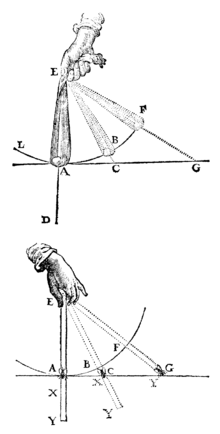Principles of Philosophy


Principles of Philosophy (Latin: Principia philosophiae) is a book by René Descartes. In essence it is a synthesis of the Discourse on Method and Meditations on First Philosophy[1] It was written in Latin, published in 1644 and dedicated to Elisabeth of Bohemia, with whom Descartes had a long-standing friendship. A French version (Les Principes de la Philosophie) followed in 1647. It set forth the principles of nature—the Laws of Physics—as Descartes viewed them. Most notably, it set forth the principle that in the absence of external forces, an object's motion will be uniform and in a straight line. Newton borrowed this principle from Descartes and included it in his own Principia; to this day, it is still generally referred to as Newton's First Law of Motion.[2] The book was primarily intended to replace the Aristotelian curriculum then used in French and British Universities. The work provides a systematic statement of his metaphysics and natural philosophy, and represents the first truly comprehensive, mechanistic account of the universe.
Preface to the French edition
Descartes asked Abbot Claude Picot to translate his Latin Principia Philosophiae into French. For this edition he wrote a preface, disguised as a letter to the translator, whose title is "Letter of the author to the translator of the book, that may be used as a preface". This was published in 1647, a date already in the maturity final period of his life. In this writing Descartes pours some reflexions about his idea of wisdom and philosophy. Its content may be summarized as follows.[3]
Concept of philosophy. Philosophy is the study of wisdom, understood as the ability to conduct the human activities; and also as the perfect knowledge of all the things that a man can know for the direction of his life, maintenance of his health, and knowledge of the arts. Only God is perfectly wise, and the man is more or less wise, in proportion to the knowledge he has of the most important truths.
The degrees of knowledge. Descartes identifies four degrees of knowledge, he names common, and a fifth one he designates as higher. The first degree consists on clear and evident notions that can be acquired without need of any meditation. The second degree is all that is learned by means of the senses. The third comprises what we learn when talking with other men. The fourth consists on what we can learn from the writings of men capable of giving good instructions.
Higher wisdom. There have been great men in all times that have sought after a better and more secure wisdom, a fifth degree of knowledge. This has consisted on the search for the first causes, and those that have followed this pursuit have been named philosophers, but he thinks that no one has been successful yet.
Doubt and certainty. Since Plato and Aristotle there has been a discussion about doubt and certainty. Those that have favored doubt have arrived to extremes of doubting even the most evident things, and those that have sought certainty have relied excessively on senses. Though it is true that it has been accepted that the senses may mislead us, according to Descartes nobody had yet expressed that the truth can not be based on the senses, but in the understanding, when it is founded on evident perceptions.
Meditations on first philosophy. The search for the first causes, or basic truths, as undertaken by Descartes is contained in this work. It explains the metaphysical principles on which to build the rest of knowledge.
The tree of philosophy. The philosophy is like a tree, whose roots are the metaphysics, its trunk the physics, and the branches the rest of sciences, mainly medicine, mechanics, and morals that is the last level of wisdom. In the same way that the tree has its fruits in its outer parts, the usefulness of philosophy is also contained in the parts that are learnt at the end.
Copies and prints
A copy of Descartes' Principia philosophiae dated 1656 is owned by the Tom Slick rare book collection at the Southwest Research Institute in Texas.
Editions
- Descartes, René (1983) [1644, with additional material from the French translation of 1647]. Principia philosophiae (Principles of Philosophy). Translation with explanatory notes by Valentine Rodger and Reese P. Miller (Reprint ed.). Dordrecht: Reidel. ISBN 90-277-1451-7.
See also
References
- ↑ Guy Durandin, Les Principes de la Philosophie. Introduction et notes, Librairie Philosophique J. Vrin, Paris, 1970.
- ↑ D.T. Whiteside, The prehistory of the Principia Notes Rec. R. Soc. Lond. 45, 13 (1991).
- ↑ René Descartes. "Letter of the Author to the French Translator of the Principles of Philosophy serving for a preface". John Veitch (trans.). Retrieved December 2011. Check date values in:
|access-date=(help)
External links
 Works related to Selections from the Principles of Philosophy at Wikisource
Works related to Selections from the Principles of Philosophy at Wikisource Latin Wikisource has original text related to this article: Principia philosophiae
Latin Wikisource has original text related to this article: Principia philosophiae- Descartes' 1644 Principia philosophiae (free Google eBook)
- Selections from the Principles of Philosophy at Project Gutenberg
- Principles of Philosophy, modified for easier reading
- Principia philosophiae. Amstelodami, apud Ludovicum Elzevirium, 1644. From the Rare Book and Special Collections Division at the Library of Congress
